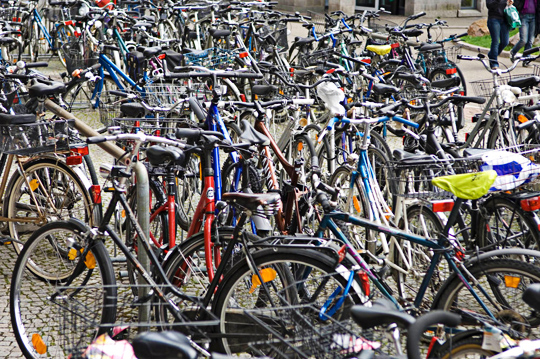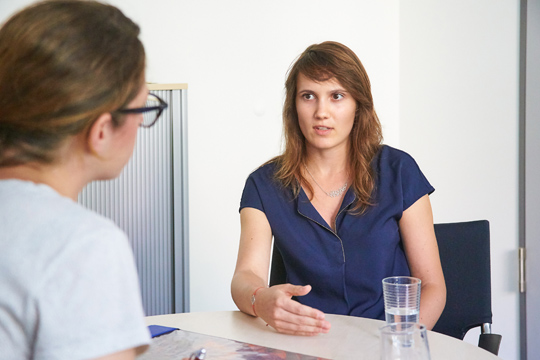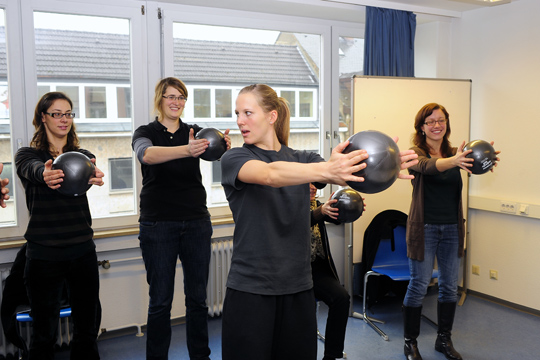Coordinating and Professionalizing Sustainability
Freiburg, Sep 12, 2019
Lora Gyuzeleva has been the sustainability manager in the Office of Environmental Conservation since mid-July 2019. The 26-year-old speaks with Kristin Schwarz about her new responsibilities. She explains how the University of Freiburg practices sustainability and identifies areas where there is still room for improvement.

Where should all the bikes go? A comprehensive mobility concept for the university should help answer this question. Photo: Joachim Hirschfeld
Ms. Gyuzeleva, why did the University of Freiburg create the position of sustainability manager?
Lora Gyuzeleva: For years, the university has been committed to environmental and climate conservation and has already implemented a range of resource-saving measures for internal operations. The members of the Sustainable University Work Group of the University of Freiburg got these projects up and running in their areas of responsibility – yet most of them were doing this alongside of their daily tasks. Because sustainability is becoming more and more important, the need grew for a position that could strategically coordinate and professionalize the approach to this issue. My position fills that niche.
That sounds like a pretty broad range of responsibilities. What are you concentrating on now?
Currently, I'm exchanging information with representatives of all the departments. One aim is to increase cooperation with teachers, research, and administration. Another is to assess the state of things as they are now. What interests me, among other things, are which resources are being consumed and the social aspects of sustainability. After meetings, I evaluate the data and suggest measures that will fully tap potentials for optimization of resource use. In the long term, I'm planning to prepare a sustainability report that incorporates the information I am gathering. In addition, I investigate how other universities practice sustainability and try to find out if there are best-practice examples that would work for us as well. Networking with internal and external partners is on my agenda as well.

Lora Gyuzeleva studied Environmental Governance at the University of Freiburg. Now she's using her knowledge to advance sustainability at her alma mater. Photo: Harald Neumann
Young adults are more and more interested in the issues surrounding sustainability. How are you addressing this development?
We're noting that an increasing number of students are taking part in work groups and initiatives for climate and environmental conservation. That's positive. As I result, I'd like to expand cooperation with these groups and raise awareness of course offerings, research projects, and activities related to sustainability. In order to meet the growing demand, the Center for Key Qualifications is offering an interdisciplinary lecture series "Sustainability" in the 2019/2020 winter semester. In future, what's known as a "Studium Oecologicum" is planned as well.
There are many aspects of sustainability at the University of Freiburg. Could you please give us some examples?
In order to conserve resources, we use recycled paper with the "Blue Angel" seal and environmentally-friendly cleaning products. We use groundwater for cooling and have been able to reduce packaging waste by putting toxic waste almost exclusively in reusable containers. Beyond that, the university has issued obligatory environmental directives and is well on its way to compliance with the terms of the ISO 500001 energy management norm. Social sustainability is important, too. For that, there are a university health management program and initiatives to improve work-life balance. We'd also like to motivate others to join us along the way. With the DezMon Project, we've set financial incentives for saving energy, and people who buy their coffee in reusable cups or have their own cup filled, get a ten cent discount at official sales outlets of the Freiburg "Studierendenwerk."

Social sustainability is important as well as environmental sustainability. Examples of that can be found in the offerings of University Health Management. Photo: Thomas Kunz
In spite of all the measures you've named, where do you still see room for improvement?
In terms of mobility. A comprehensive concept is needed for this – one that includes solutions for the lack in space to put bicycles. One option could be bike racks that hold the bicycles on at least more than one level. At the same time, we're also currently investigating how the staff and students get around. We're examining the environmental impacts of excursions and business trips in order to make these more sustainable in future – by finding alternatives to flights or measures to offset CO2 emissions.
What are the challenges confronting you?
The university has the status of a tenant on state-owned real estate. As a result, we're unable to make all the structural changes needed for improvements. This is true, for example, when it comes to renovating buildings to make them more energy-efficient or installing solar panels on the roofs. Beyond that, how climate and environmentally-friendly we are depends on the behavior of everyone involved. We provide tips on how to save energy and hold events such as photo contests or quizzes in order to impart knowledge and increase people's awareness. The natural fluctuation of employees and students makes it difficult, however, to continually maintain the same standards or improve.

